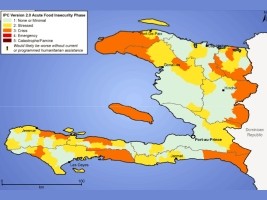|
||||||||||||||||||
| Download the revised decree and electoral calendar, published in the official journal |
|
|
Haiti - FLASH : Skyrocketing prices of local products 16/10/2015 09:27:29
The persistent upward trends in the prices of local products and basic necessities are moving quickly after the long drought that hits the country. The Poorer, whose income sources are seriously affected by this situation, are seeing their purchasing power collapse facing the considerable increase in prices. In the South-East, the North-West, North-East and South Peninsula the crisis (IPC Phase 3) will continue until December 2015, according to the latest updates by the National Coordination for Food Security (CNSA) last August. Indeed, the markets continue to lack availability of local products. The increase on the prices varied between 20 and 50% for local ground corn and between 80 to 130% for beans. Apart from local products, some products like imported rice and wheat have registered a variation of 5 to 10% and from 13 to 39% respectively. [note that the import restrictions by road of 23 Dominican products, many of basic necessities, also contributes to the increase in local markets https://www.icihaiti.com/en/news-15425-icihaiti-flash-fenatrado-imposes-a-border-blockade.html ] For the Northern Department, erratic rainfall has affected many crops, such as beans and corn, with a loss rate of 70 to 80 percent. In the rice-growing areas of the North-East department rice crops are underway, but the lack of water prevents the establishment of nursery for the fall campaign. By the other hand, in the Artibonite Valley, rice farmers conduct transplanting operations for crops that will be held in the month of November. The biggest challenges remain the low availability of water and the price of chemical fertilizer that is sells for more than 1,500 gourdes against 900 gourdes set by the Ministry of Agriculture. Impact on vulnerable populations : The lack of availability of agricultural products and lower revenue have been affecting the capacity of poor households to access food without resorting to negative coping strategies that can threaten their future consumption. Drought has exacerbated the shortage of water in several municipalities of Artibonite, South-East and South departments among others. This context increases the risk of waterborne diseases, as households are forced to use water of doubtful origin. In some cases, as in the South-East, the water shortage prevents families to prepare food or to take baths. Apart from the scarcity caused by drought, some areas in several departments received light rains falls, somehow enhancing the current crop. In the South department, the most important crops are those of perennial crops although they remain under normal levels. The harvest of the main products, including maize and beans, is more significant in irrigated areas, although they have also been affected by the lack of water in riverbeds. Nevertheless, these rains are clearly insufficient to mitigate the damage of the drought caused by El Niño in the country. According to the outlook of both CNSA and FEWS-Net, there is a strong likelihood that El Niño (less than normal rainfall) will persist until the beginning of 2016. The forecast is rather pessimistic for the next winter season compared to the climate rampant and limited inputs. And due to the inadequacy of response actions to address deficits, the country cannot prevent potential risks of deterioration of food security in the coming months. HL/ HaitiLibre
|
|
|
Why HaitiLibre ? |
Contact us |
Français
Copyright © 2010 - 2026 Haitilibre.com |





